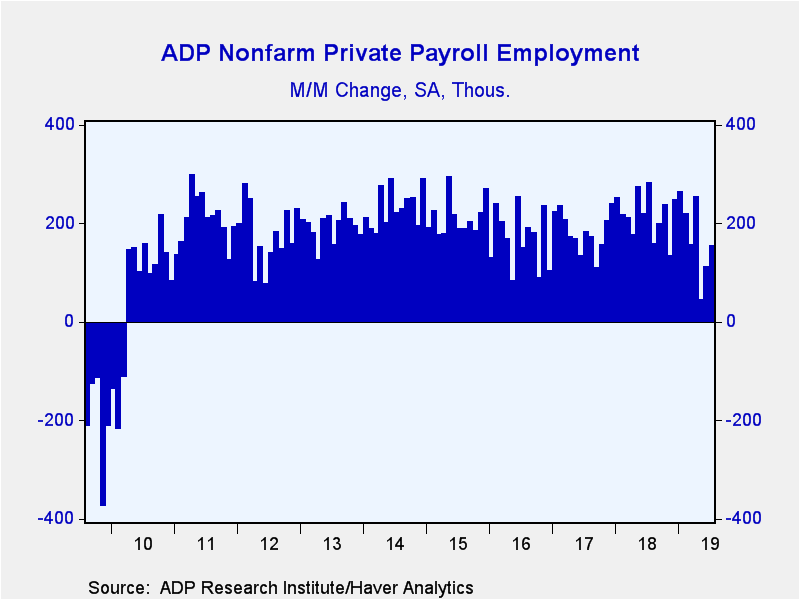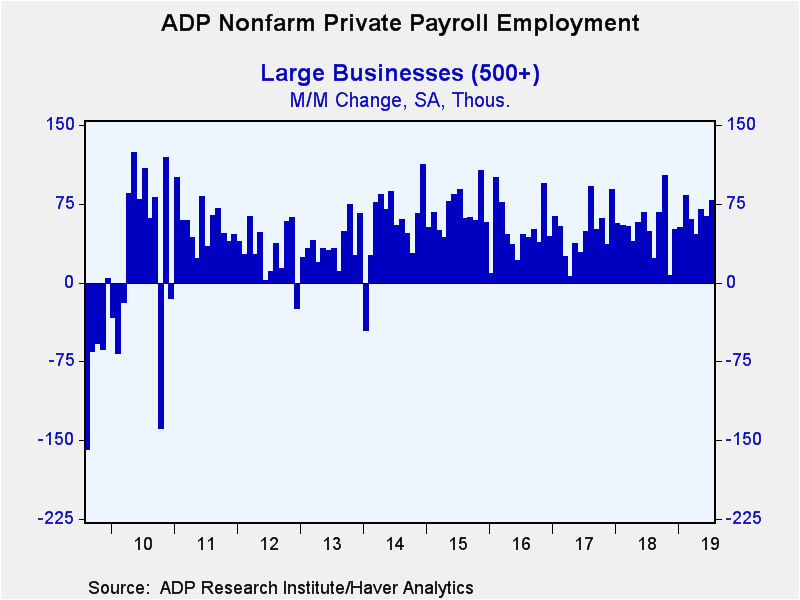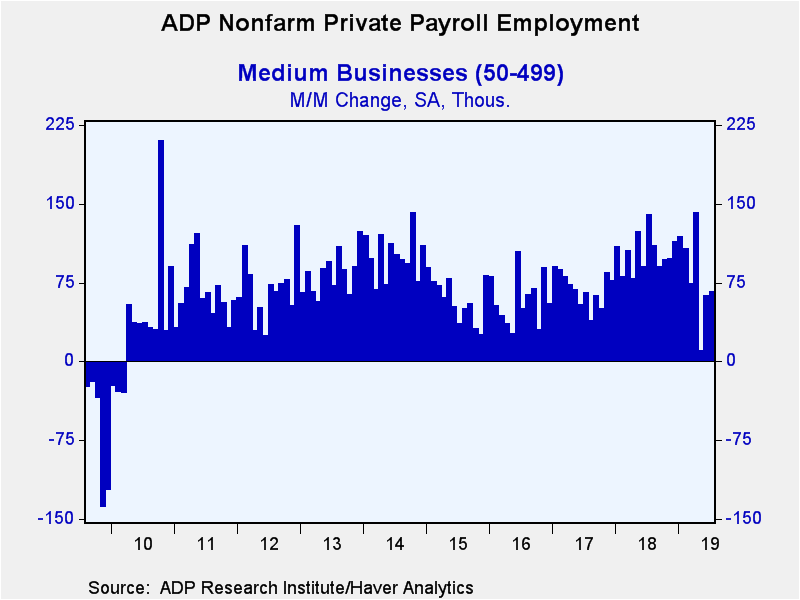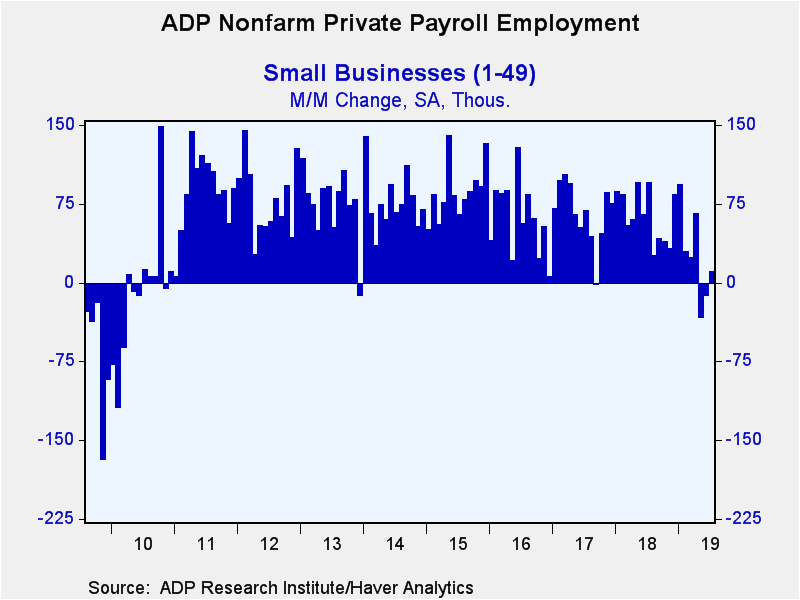 Global| Jul 31 2019
Global| Jul 31 2019U.S. ADP Private Payroll Growth Improves
by:Tom Moeller
|in:Economy in Brief
Summary
Hiring in the private sector continued its recent upward trend this month. The ADP National Employment Report indicated that private nonfarm payrolls increased 156,000 (1.7% y/y) during July following a 112,000 June rise, revised from [...]
Hiring in the private sector continued its recent upward trend this month. The ADP National Employment Report indicated that private nonfarm payrolls increased 156,000 (1.7% y/y) during July following a 112,000 June rise, revised from 102,000. Payrolls increased 46,000 during May, revised from 41,000. A 155,000 increase had been expected in the Action Economics Forecast Survey. ADP payrolls grew an average of 104,000 during the last three months, down from a July 2018 high of 260,000. During the last ten years there has been a 79% correlation between the change in the ADP figure and the change in nonfarm private-sector payrolls as measured by the Bureau of Labor Statistics.
Small-sized business hiring improved 11,000 (0.8% y/y) last month following a 13,000 decline during June, and a 34,000 May drop. Medium-sized payrolls grew 67,000 (2.4% y/y), about the same as in June and up sharply from the May rise of 10,000. Large-sized payrolls strengthened 78,000 (2.4% y/y), the strongest increase since February.
Private service-sector payrolls increased 146,000 (1.8% y/y) reflecting a 44,000 increase (2.5% y/y) in professional & business services hiring, the strongest gain in three months. The number of education & health services jobs grew 37,000 (2.3% y/y) after a 54,000 rise. The number of jobs in the leisure & hospitality sector improved 26,000 (2.1% y/y), also the largest rise in three months. Jobs in trade, transportation and utilities strengthened a steady 27,000 (1.0% y/y). Financial activities employment gained 11,000 (1.3% y/y), the strongest increase in five months while information sector payrolls declined 5,000, unchanged y//y.
Employment in the goods-producing sector improved 9,000 (1.5% y/y) in July following two months of decline. Construction sector payrolls rose 15,000 (2.7% y/y), after falling for two months. Jobs in the factory sector inched 1,000 higher (1.0% y/y). Lower oil prices continued to weigh on job growth in the natural resource & mining sector. Payrolls here declined 4,000 (-0.3% y/y), the largest of four straight monthly declines.
The Automatic Data Processing Research Institute survey is based on ADP's business payroll transaction system covering 411,000 companies and nearly 24 million employees. The data are processed by Moody's Analytics Inc., then calibrated and aligned with the BLS establishment survey data. The ADP data cover private sector employment only.
The ADP National Employment Report data can be found in Haver's USECON database. Historical figures date back to 2001 for private employment and the industry breakdown, and 2005 for the business size breakout. The expectation figure is available in Haver's AS1REPNA database.
| ADP/Moody's National Employment Report | Jul | Jun | May | Jul Y/Y | 2018 | 2017 | 2016 |
|---|---|---|---|---|---|---|---|
| Nonfarm Private Payroll Employment (m/m chg, 000s) | 156 | 112 | 46 | 1.7 | 2.0 | 1.7 | 2.0 |
| Small Payroll (1-49) | 11 | -13 | -34 | 0.8 | 1.5 | 1.5 | 1.9 |
| Medium Payroll (50-499) | 67 | 63 | 10 | 2.4 | 2.3 | 1.8 | 1.5 |
| Large Payroll (>500) | 78 | 63 | 70 | 2.4 | 2.3 | 2.1 | 2.7 |
| Goods-Producing | 9 | -1 | -22 | 1.5 | 3.1 | 1.7 | 0.8 |
| Construction | 15 | -6 | -21 | 2.7 | 5.0 | 3.3 | 4.3 |
| Manufacturing | 1 | 7 | 1 | 1.0 | 1.8 | 0.8 | 0.1 |
| Service-Producing | 146 | 113 | 68 | 1.8 | 1.7 | 1.8 | 2.2 |
Tom Moeller
AuthorMore in Author Profile »Prior to joining Haver Analytics in 2000, Mr. Moeller worked as the Economist at Chancellor Capital Management from 1985 to 1999. There, he developed comprehensive economic forecasts and interpreted economic data for equity and fixed income portfolio managers. Also at Chancellor, Mr. Moeller worked as an equity analyst and was responsible for researching and rating companies in the economically sensitive automobile and housing industries for investment in Chancellor’s equity portfolio. Prior to joining Chancellor, Mr. Moeller was an Economist at Citibank from 1979 to 1984. He also analyzed pricing behavior in the metals industry for the Council on Wage and Price Stability in Washington, D.C. In 1999, Mr. Moeller received the award for most accurate forecast from the Forecasters' Club of New York. From 1990 to 1992 he was President of the New York Association for Business Economists. Mr. Moeller earned an M.B.A. in Finance from Fordham University, where he graduated in 1987. He holds a Bachelor of Arts in Economics from George Washington University.
More Economy in Brief
 Global| Feb 05 2026
Global| Feb 05 2026Charts of the Week: Balanced Policy, Resilient Data and AI Narratives
by:Andrew Cates










